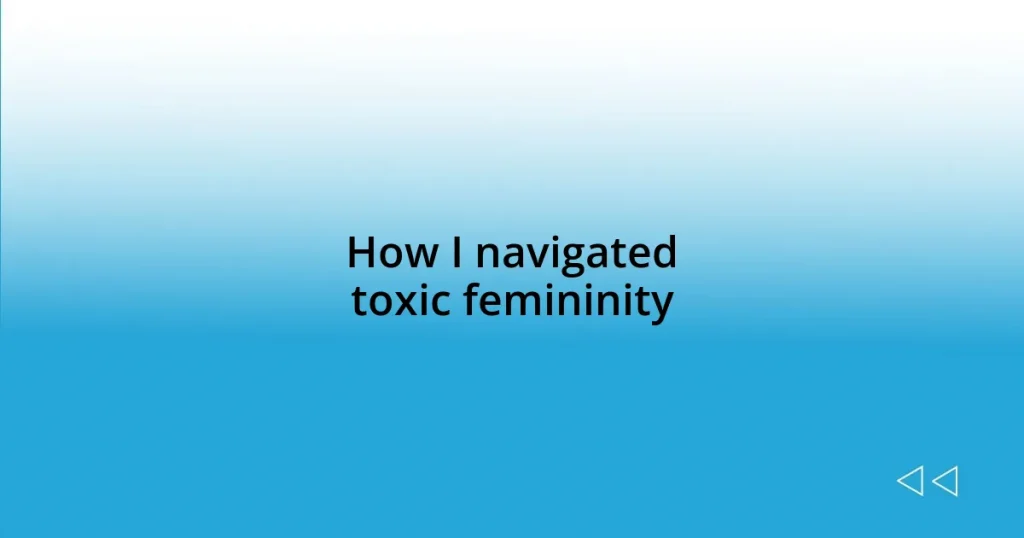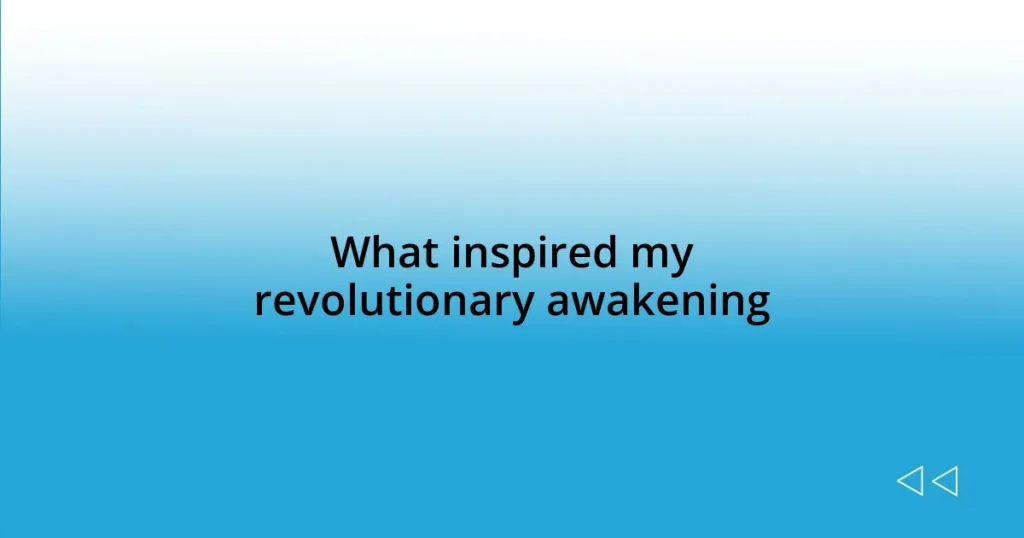Key takeaways:
- Toxic femininity leads to unrealistic expectations of self-sacrifice, affecting self-worth and relationships.
- Identifying toxic behaviors like people-pleasing and emotional manipulation is crucial for personal growth.
- Healthy relationships are built on open communication and mutual respect, contrasting with the superficial nature of toxic connections.
- Embracing authenticity and vulnerability fosters empowerment and stronger connections among women.
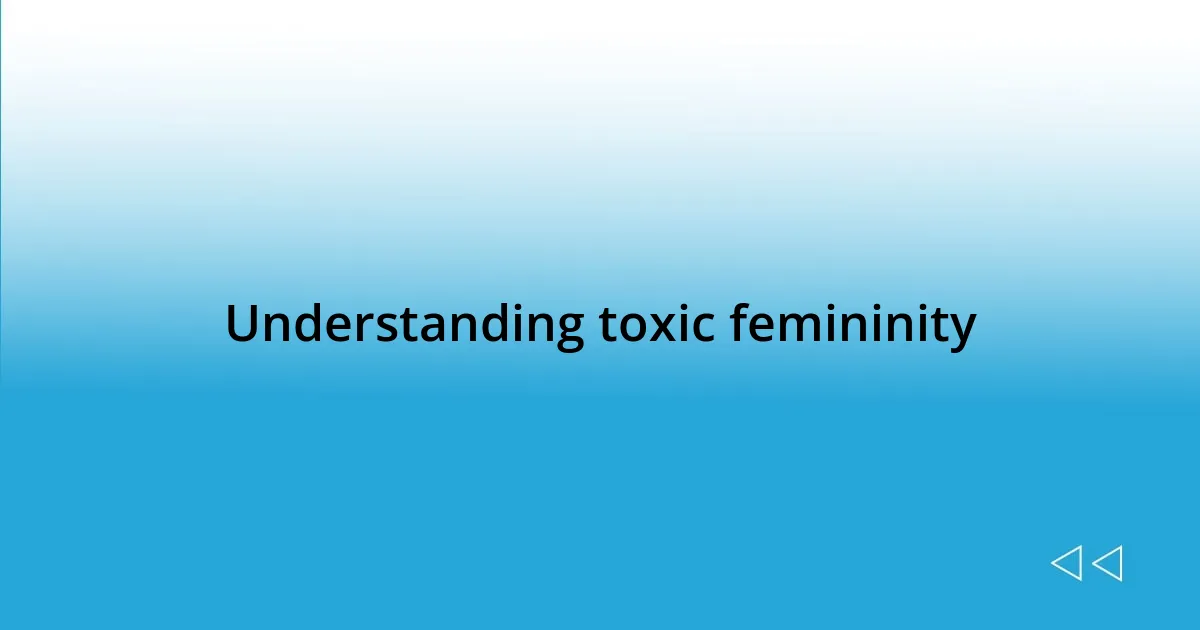
Understanding toxic femininity
Toxic femininity often manifests as the pressure to conform to overly traditional gender roles, which can be suffocating. I remember a time in my own life when I felt compelled to always prioritize others’ needs over my own desires. This constant self-neglect led to resentment and a nagging sense of unfulfillment, making me wonder: why do we sometimes feel that our worth is measured by how much we can sacrifice for others?
This notion of being “the perfect woman” can create unrealistic expectations. It’s tempting to fit the mold society sets for us, but in my experience, embracing vulnerability and expressing genuine emotions often felt like a rebellion against those norms. I’ve had moments when I hesitated to voice my true feelings—didn’t you ever feel you had to stifle your voice to keep the peace?
Moreover, the impact of toxic femininity permeates not just individual lives but also relationships. I noticed that much of my inner turmoil stemmed from wanting to please everyone, often leading to shallow connections. Have you ever found yourself in a situation where the desire to be agreeable overshadowed your authenticity? Through these experiences, I’ve realized that authenticity and true strength come from embracing our complexity, rather than adhering to the superficial ideals of femininity.
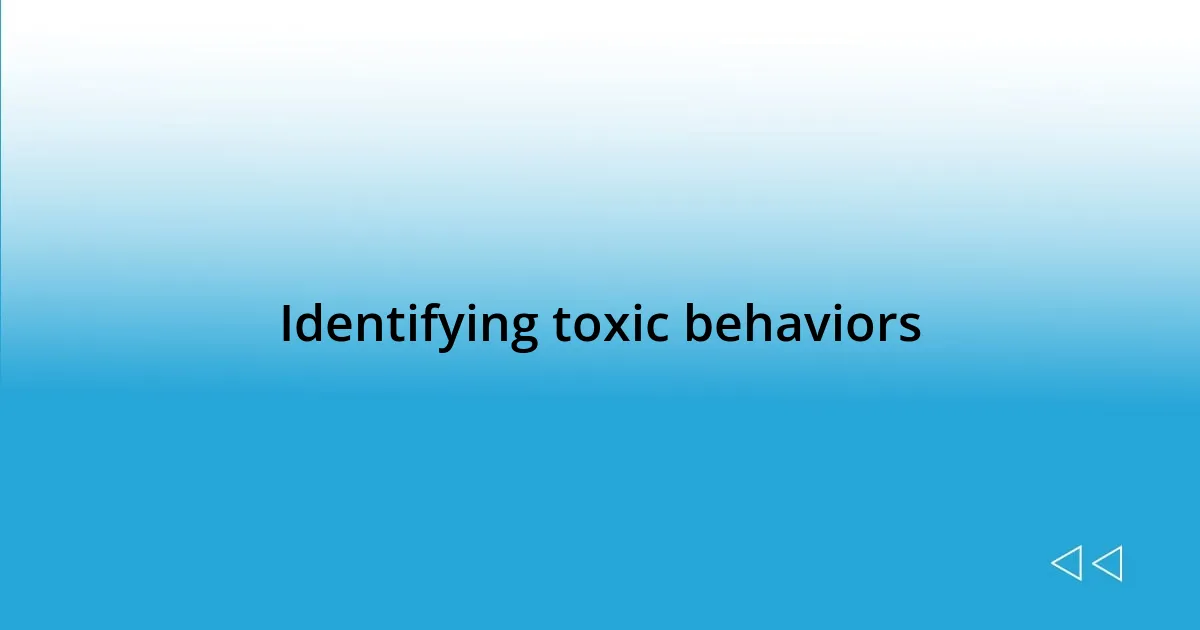
Identifying toxic behaviors
Recognizing toxic behaviors is the first step toward reclaiming our identities. I’ve come to notice specific patterns that often indicate something deeper is at play, especially when the actions of myself or others prioritize superficial standards. For example, I used to feel that being agreeable was a virtue, but I soon realized it was a form of self-betrayal. It’s those little moments when I’d suppress my thoughts or feelings to keep the peace that highlighted the toxicity of those expectations.
To help identify toxic behaviors, consider these signs:
- Constant people-pleasing: If you find yourself always saying “yes” when you’d rather say “no,” it’s worth reflecting on why.
- Comparison with others: Feelings of inadequacy arise when you measure your worth against others’ achievements or lifestyles.
- Emotional manipulation: Watch for when guilt is used to influence your decisions or when your feelings are minimized.
- Internalized stereotypes: Notice if you often conform to cultural norms that dictate how a woman “should” act, regardless of your personal beliefs.
- Ignoring boundaries: Pay attention to whether you dismiss your wants or needs to keep others comfortable.
Each of these behaviors can chip away at our self-esteem, often without us even recognizing it until we hit a breaking point. Embracing these realizations isn’t easy, but I’ve found that acknowledging them brings clarity and the opportunity for genuine growth. I recall feeling a mixture of fear and liberation when I finally allowed myself to say “no” to demands I previously felt obligated to meet. That moment was punctuated by a sense of freedom that I didn’t know I was missing.
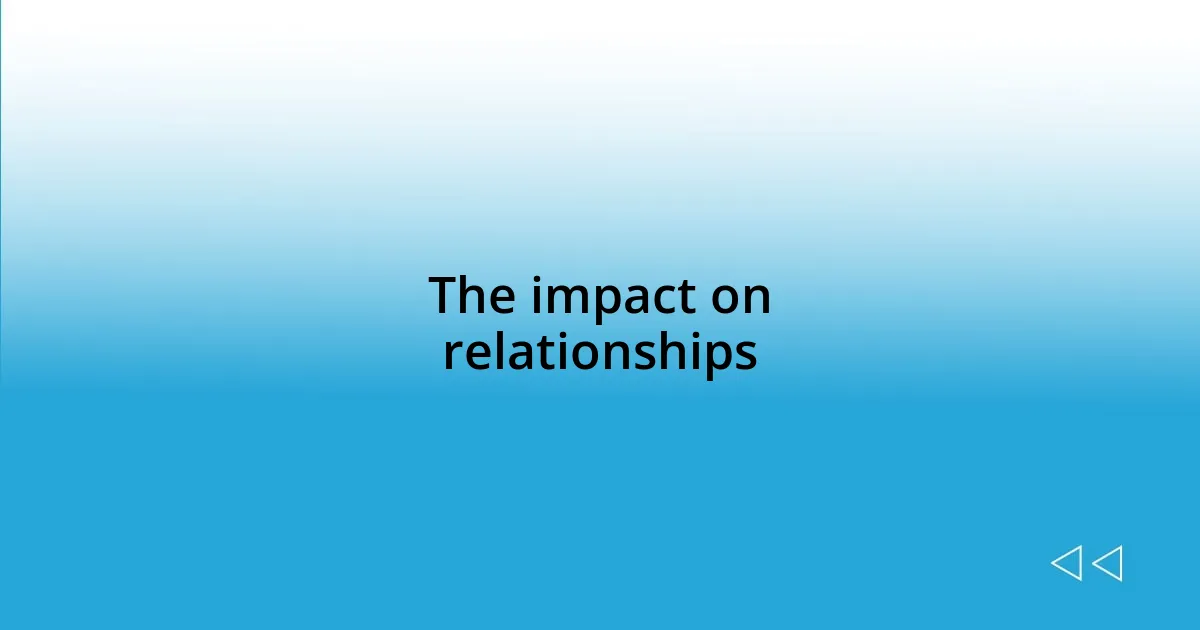
The impact on relationships
The way toxic femininity shapes relationships is profound, often creating a web of misunderstanding and unspoken resentment. I recall feeling trapped in a cycle where I believed my value came from being accommodating. This led to relationships that felt more about maintenance than genuine connection. Ever been stuck in conversations that revolved around keeping others comfortable while your own feelings simmered beneath the surface? I certainly have.
It’s striking how these influences can distort communication patterns. For instance, one partner may constantly suppress their emotions to protect the other from discomfort, resulting in a disconnect that feels insurmountable. I personally experienced this when my need for openness clashed with a partner’s reliance on superficial harmony. This journey taught me that voicing discomfort can actually pave the way for deeper understanding.
In my observations, the repercussions extend to family dynamics as well. I once noticed how my mother struggled to assert her own needs, leading to tension with my father. Their relationship seemed to thrive on a facade of agreement, yet it often felt strained under the surface. This taught me that breaking free from toxic expectations not only benefits individuals, but can also transform relationship health over time.
| Healthy Relationships | Toxic Relationships |
|---|---|
| Open communication | Stifled expression |
| Mutual respect | Expectations of sacrifice |
| Authenticity | Superficiality |
| Empowerment to express needs | Emotional suppression |
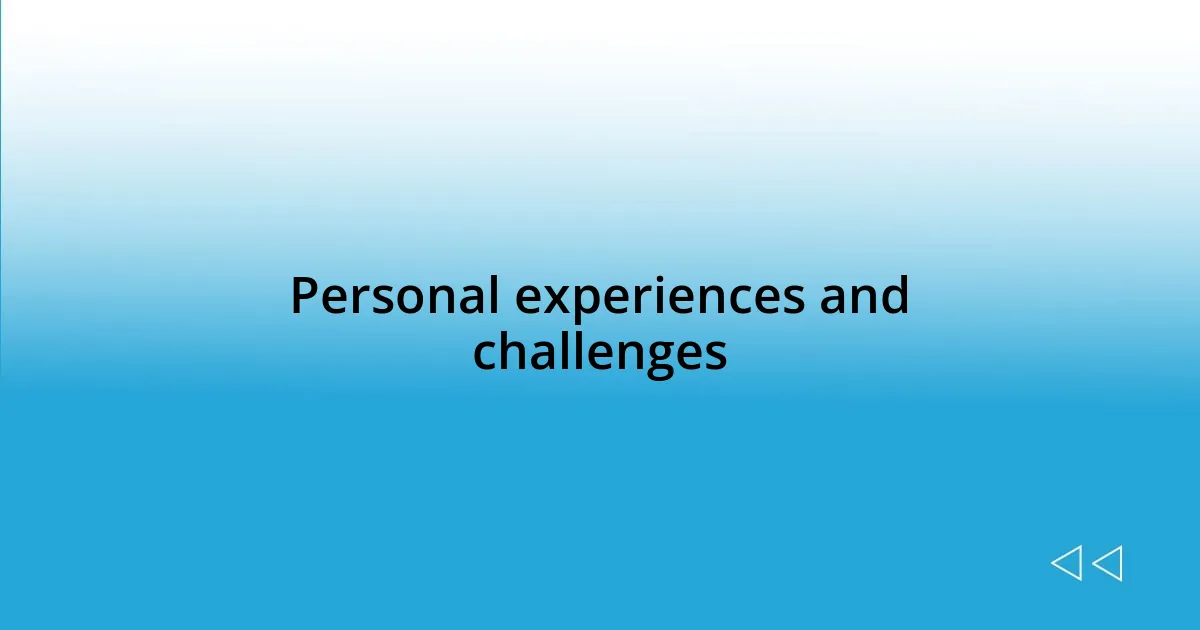
Personal experiences and challenges
Navigating toxic femininity has been a journey filled with uncomfortable realizations. I still remember an incident in college when I masked my true feelings during a group project out of fear that confrontation would upset my classmates. Instead, I ended up feeling overlooked and resentful, which sparked my curiosity: why had I prioritized their comfort over my own needs? This was a pivotal moment that marked the beginning of my quest to redefine my boundaries.
There was also a time when a close friend relied heavily on me for emotional support while never reciprocating. Initially, I relished being the “go-to girl,” believing it was a badge of honor. But as the one-sidedness weighed on me, I felt drained and unappreciated. Have you ever felt that twinge of resentment when realizing your needs have been sidelined? Those feelings became my wake-up call, pushing me to reevaluate what genuine friendship should feel like—an exchange, not an obligation.
Perhaps the hardest lesson was seeing how these dynamics echoed in my upbringing. My grandmother had a habit of suppressing her desires for the sake of family harmony, which I witnessed firsthand. Observing her struggle to voice her thoughts made me realize how history tends to repeat itself unless we intentionally break the cycle. Connecting with her stories helped me understand the importance of asserting myself, not just for my sake but for future generations, demonstrating that it’s okay to prioritize self-expression and authenticity over societal expectations.
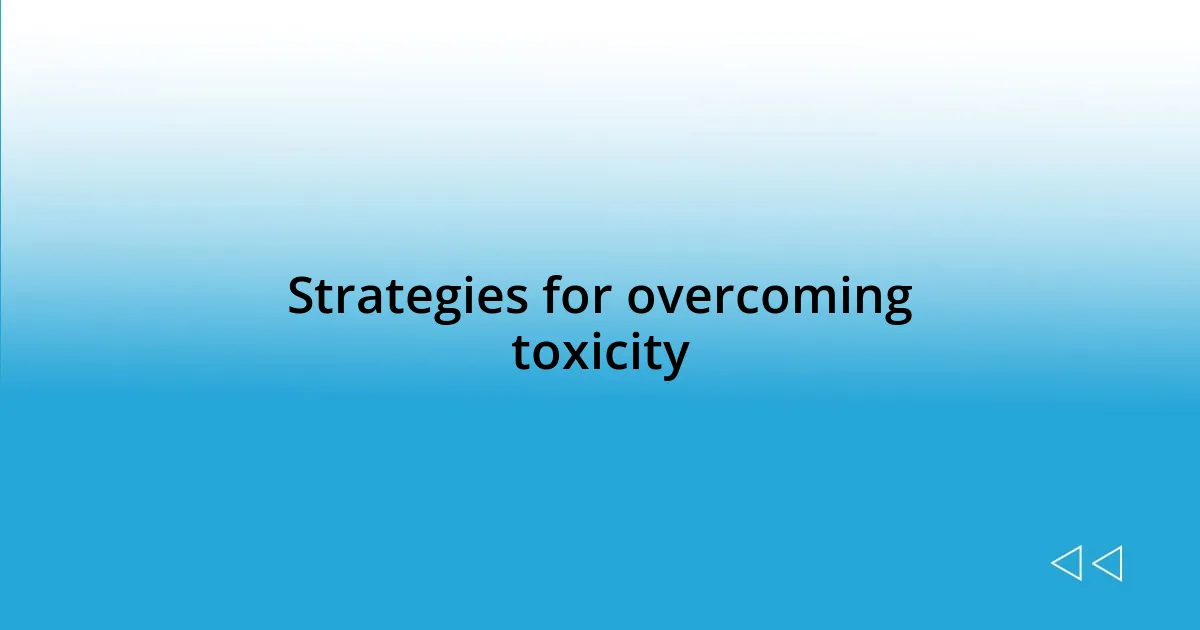
Strategies for overcoming toxicity
Finding ways to overcome toxicity is a personal journey, and I’ve discovered several strategies that help. One powerful approach is setting clear boundaries. I vividly recall a moment when I decided to say “no” to a request from a colleague that would have stretched me too thin. That small act felt liberating. It was like lifting a weight off my chest. I realized that prioritizing my time made me more effective and respected in my professional sphere.
Another crucial strategy is practicing self-reflection. I often take a moment to assess my feelings before reacting to situations. For example, there were times when I felt my patience wearing thin during family gatherings. Instead of reacting impulsively, I started to ask myself why I felt unsettled. This practice allowed me to respond from a place of understanding, which transformed my interactions with loved ones. Have you ever paused to explore the root of your emotions? It’s eye-opening.
Lastly, I found that surrounding myself with supportive individuals creates an environment that fosters growth. When I distanced myself from friends who encouraged toxic behaviors, I made space for relationships that uplift me. A friend of mine once offered unwavering support during a challenging time, reminding me how vital it is to choose allies who empower rather than drain us. I believe that when we cultivate community, we can each contribute to dismantling the toxic patterns that have held us back.
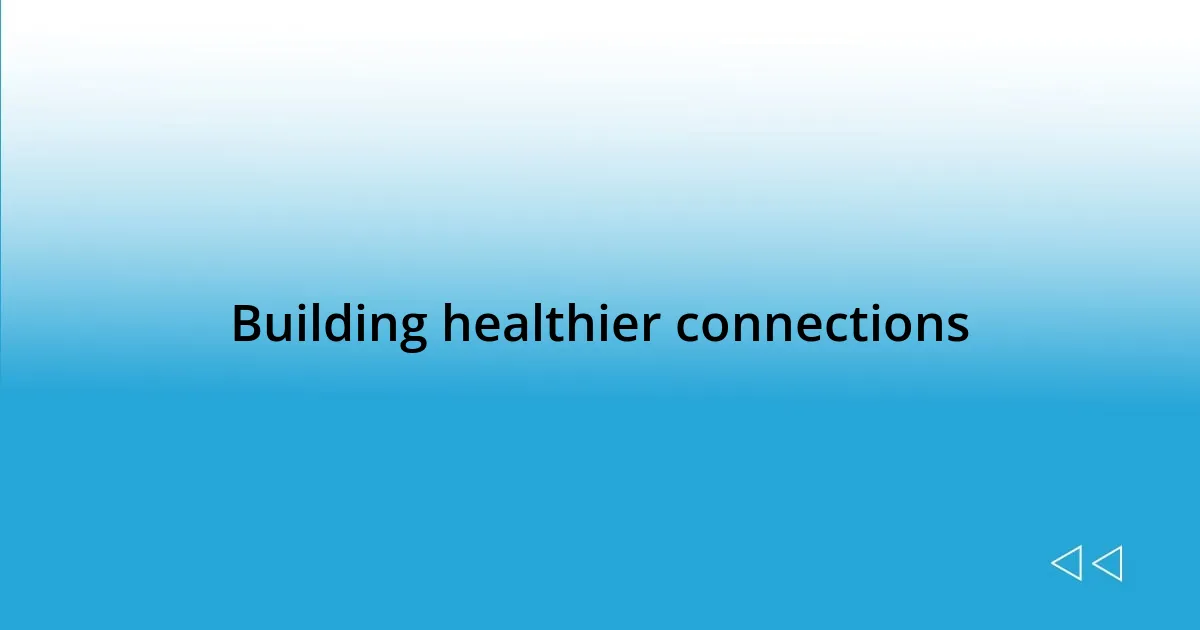
Building healthier connections
Building healthier connections begins with openness and vulnerability. I remember the first time I expressed my feelings to a friend about a misunderstanding between us; it felt like jumping into the deep end of a pool. While I was terrified, sharing my true emotions opened up a space for both of us to engage more honestly. I’ve learned that authentic conversations pave the way for more meaningful relationships.
It’s also essential to recognize the reciprocal nature of connections. I once found myself in a situation where I was always the one initiating plans with a new acquaintance. After a few weeks of this one-sided effort, I decided to step back. Surprisingly, once I prioritized my own social life and engagements, that person reached out, showing me that sometimes distance can clarify who truly values your friendship. Has this ever happened to you? Sometimes we need to create space to see who steps up.
Another critical element is fostering an environment of mutual respect. I vividly remember a group dinner where everyone’s voices were competing for attention, and I felt invisible. I took a moment to assert myself and asked everyone to share one thought at a time—this changed the atmosphere entirely. Suddenly, our conversation became richer, and everyone felt heard, including myself. This experience taught me that advocating for a respectful space not only benefits me but also enriches those around me.
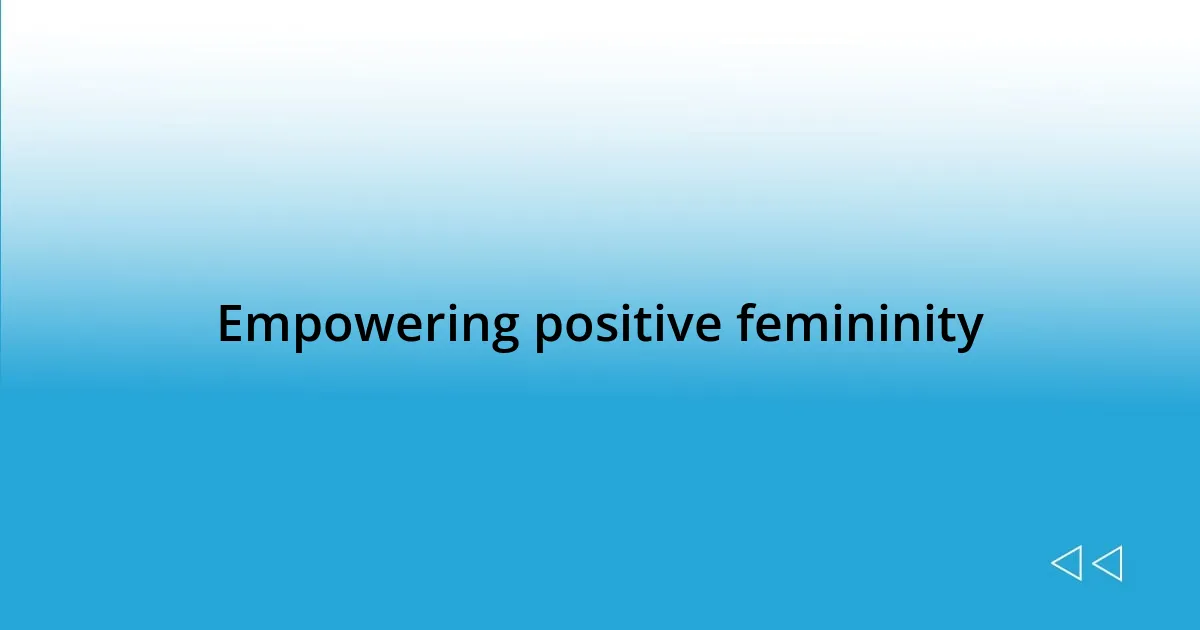
Empowering positive femininity
Empowering positive femininity starts with embracing our unique qualities and celebrating them. I remember a time when I felt pressured to conform to what society deemed “feminine.” But as I began to embrace my love for hiking and adventure, I felt more like myself. Have you ever experienced a moment where you realized you were performing instead of being genuine? That epiphany not only empowered me but also inspired others around me to express their authentic selves.
A significant aspect of positive femininity involves lifting each other up rather than competing. I recall attending a women’s networking event where, instead of feeling a sense of rivalry, I was enveloped in a spirit of collaboration. We shared our successes and challenges candidly, and as we praised one another for achievements big and small, I felt the room buzzing with real energy and support. It made me wonder: what if we spent more time celebrating each other’s wins instead of comparing ourselves? It’s a simple shift in mindset that can create a profound impact.
Lastly, stepping into our power means letting go of the need for perfection. I had a period where I was fixated on presenting an ideal version of myself online—striving to curate the perfect images and moments. When I finally chose to share my less-than-perfect days, my audience resonated deeply with that vulnerability. I realized that embracing imperfections not only set me free but also made me more relatable. Have you noticed how true connections blossom when we show up as our authentic selves? It all comes down to celebrating our real, messy journeys together.











